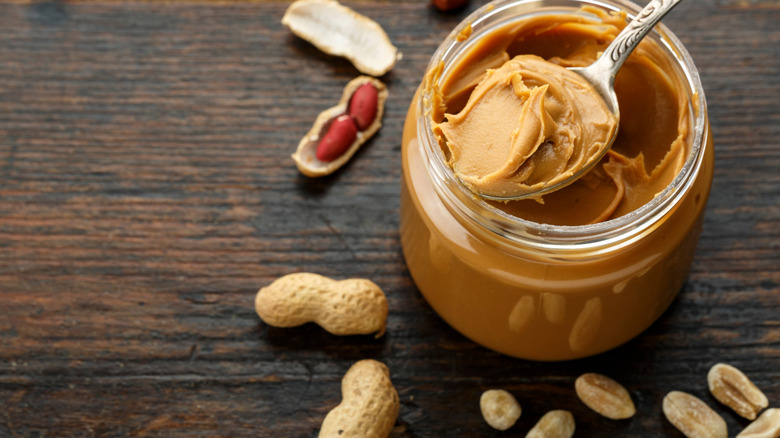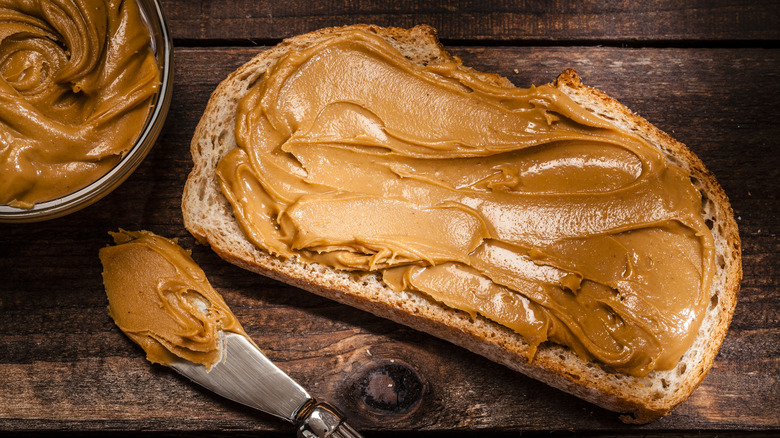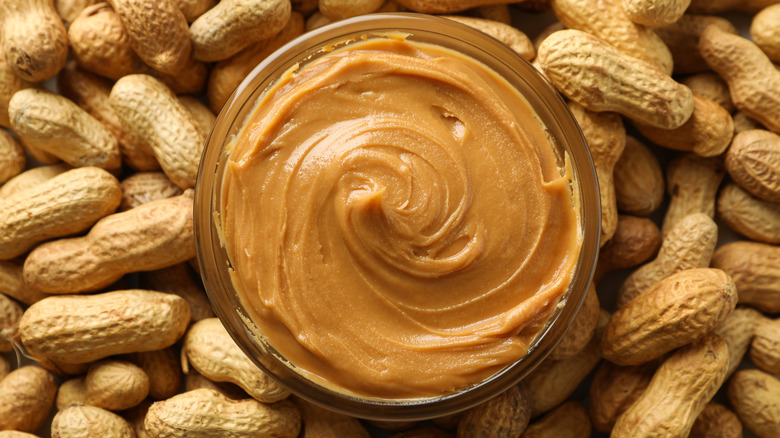Why You Should Stop Storing Peanut Butter In The Pantry
While it might be assumed that peanut butter belongs inside your cupboard, that may not always be the best option. Typically, peanut butter is considered shelf-stable and suitable for being stored at room temperature in the pantry rather than the fridge. That's because most varieties are rich in fat and have very little moisture, a combination that doesn't have the environment in which bacteria can thrive. But, even though the creamy spread is shelf-stable, it doesn't mean it will stay fresh in the pantry, especially if it's a natural peanut butter.
Natural varieties are made with little besides just peanuts and salt, with no stabilizers to preserve the homogeneous texture, so the natural oils that are part of the nut can quickly separate from the rest of the spread unless chilled. However, storing natural peanut butter in the refrigerator instead of the pantry will not only prevent the oil from separating, but it will also keep the oil from going rancid, consequently preserving the freshness of the contents in the jar.
Plus, storing peanut butter in the refrigerator once the jar is opened can extend its shelf life for months. In general, unopened jars of peanut butter will stay fresh for six to nine months unrefrigerated; but once they are opened, they will spoil after two to three months at room temperature.
When to put peanut butter in the refrigerator
There is good reason to store some kinds of peanut butter in the refrigerator, but it depends on several factors. While natural peanut butter has no stabilizers to prevent the oil from separating and going rancid unless it's chilled, commercial varieties have ingredients like palm or hydrogenated oils that stabilize the spread, allowing them to stay fresh even at room temperature.
It's also important to consider the climate that you live in. Labels on food items like peanut butter generally instruct that the perishables should be stored in cool and dry places, which may not always be possible. If you live in a hot and humid environment where oils could go rancid much quicker, a refrigerator may help your peanut butter stay fresher longer.
Another factor to consider is how quickly you eat a jar of peanut butter. If you frequently empty jars of peanut butter — say every month or so — they may not need to be refrigerated even if they are all-natural. On the flip side, if a jar tends to stick around your house for months on end, you may want to consider refrigerating it. That said, storing peanut butter in a refrigerator will significantly impact its texture, turning the creamy spread into a near-frozen chunk. To make the nut butter smooth again, you should either let it come back to room temperature or give it a few seconds in the microwave. Once the heat loosens the contents, it should be right back to its buttery consistency.
More tips for storing peanut butter
Whether you choose the pantry or the refrigerator, none of it will matter if you don't use certain universal tips to keep your peanut butter's freshness and texture intact. For one, never double-dip a knife or a utensil into a jar of peanut butter if it's already been used somewhere else. If you're slathering jam onto a piece of toast, for example, using the same knife for peanut butter will introduce the nut butter to bacteria, increasing the risk of mold growth and spoilage. Also, make sure to close the lid of the jar as tightly as possible because long periods of exposure to air can cause peanut butter to spoil faster.
Another ingenious way to keep the oils in natural peanut butter from separating is to store the jar upside down. When you flip a jar of peanut butter, the pool of oil that sits on the top will trickle to the bottom. As soon as you're ready to use it and flip the jar up again, the oil will be stirred back into the nut butter and distributed evenly — all without you having to use a spoon to mix it back together. By flipping the jar upside down and back up every few days, you'll ensure that any separated oil is constantly being moved through the jar, keeping your peanut butter as smooth and creamy as possible.



